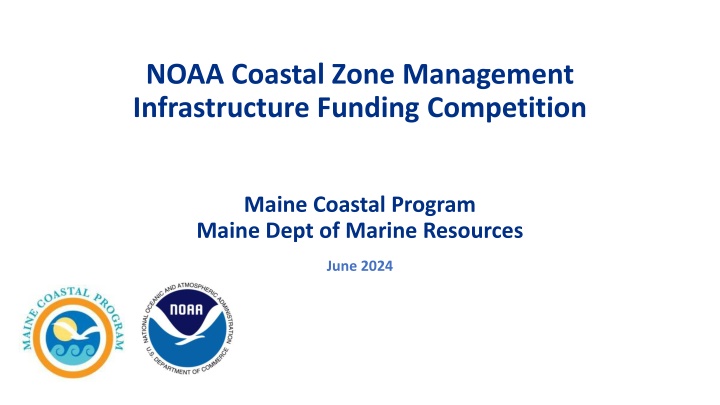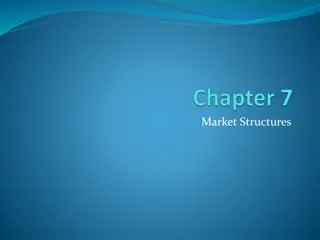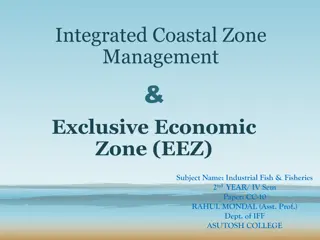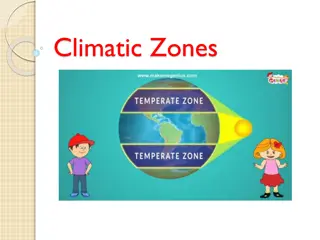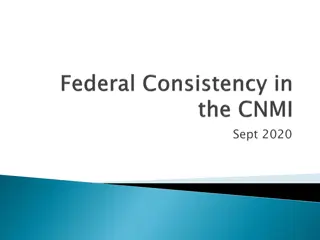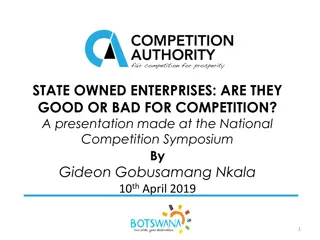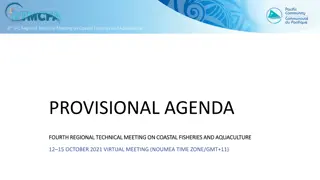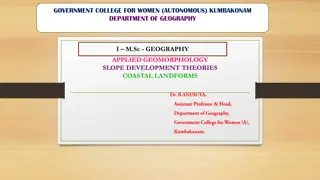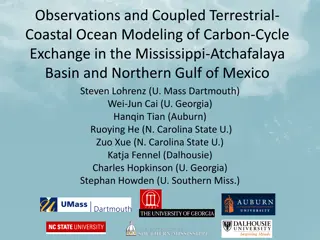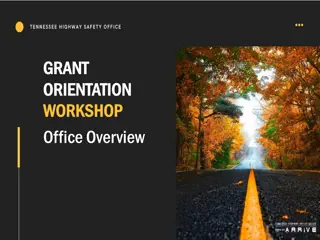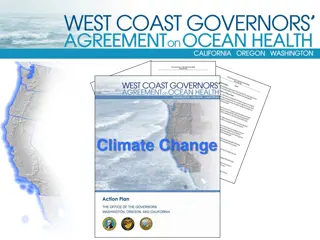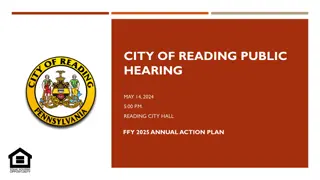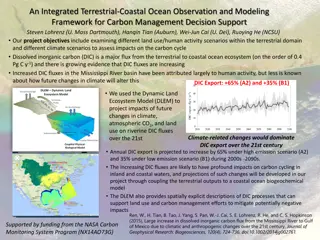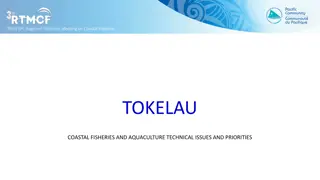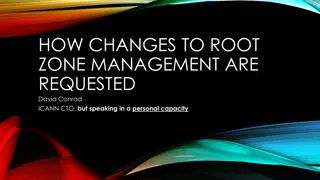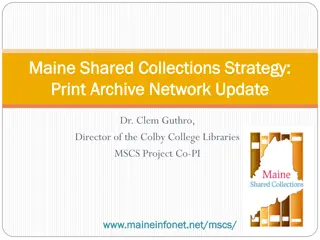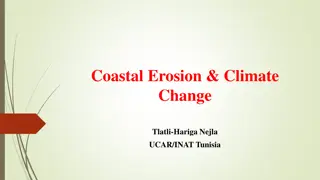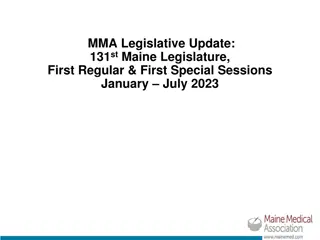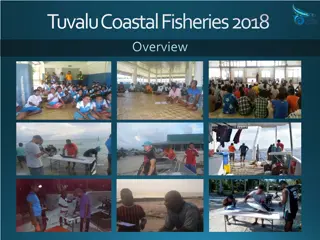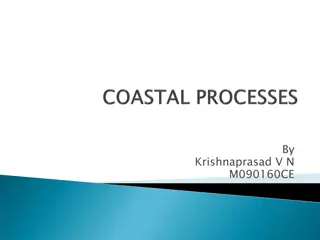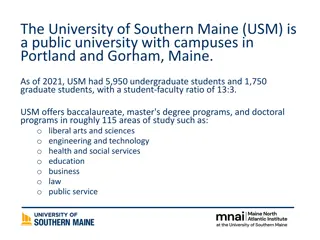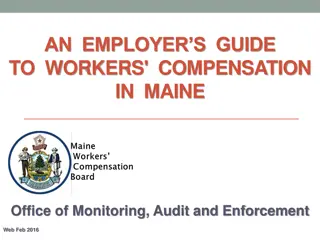Funding Competition for Coastal Zone Management Projects in Maine - FFY 2024
NOAA Coastal Zone Management Infrastructure Funding Competition is offering up to $44.6 million nationwide with $6 million available per project in Maine. Eligible projects include land acquisition, habitat restoration, planning, engineering, and design within Maine's coastal zone. The competition timeline, priority criteria, and application process are detailed, emphasizing readiness to start projects, climate change considerations, equity, and leveraging funding sources.
Download Presentation

Please find below an Image/Link to download the presentation.
The content on the website is provided AS IS for your information and personal use only. It may not be sold, licensed, or shared on other websites without obtaining consent from the author.If you encounter any issues during the download, it is possible that the publisher has removed the file from their server.
You are allowed to download the files provided on this website for personal or commercial use, subject to the condition that they are used lawfully. All files are the property of their respective owners.
The content on the website is provided AS IS for your information and personal use only. It may not be sold, licensed, or shared on other websites without obtaining consent from the author.
E N D
Presentation Transcript
NOAA Coastal Zone Management Infrastructure Funding Competition Maine Coastal Program Maine Dept of Marine Resources June 2024
NOAA Coastal Zone Management FFY 2024 Infrastructure Funding Competition https://coast.noaa.gov/funding/bil/ Maine Coastal Program is currently recruiting for projects. Available Funding: Estimated $44.6 million available nationwide. Project Location: Must be within Maine s coastal zone or coastal watershed county. https://www.maine.gov/dmr/programs/maine-coastal-program/coastal-zone-map Max Funding: $6 million per project in Maine. Application Process: The Maine Coastal Program can submit up to 3 Letters of Intent to NOAA.
What is being funded? There are three types of eligible projects, each project with potential to be funded up to $6 million. Type 1 Type 2 Type 3 Land Acquisition Habitat Restoration Planning, Engineering, and Design Publicly owned or leased land Allows for passive public access NGOs not eligible to serve as direct applicants for land acquisition grants Habitat Restoration
FFY 2024 Competition Process and Timeline June July, 2024: MCP recruits for eligible projects (through Restoration Practitioners, Tribal Governments, Coastal towns, and Regional Planning Organizations) June 17, 2024: Notice of Funding Opportunity Posted on grants.gov June 24 and June 27, 2024: NOAA Informational Webinars June 10 July 15, 2024: Project Proponents must notify MCP of their interest in this program and schedule a remote 30- minute consultation meeting. Contact Robert Van Riper at robert.vanriper@maine.gov or 207-592-5689 to schedule. July August, 2024: MCP works with most promising projects to develop Letters of Intent August 15, 2024: MCP Submits up to three letters of intent to NOAA. October 1, 2024: NOAA notifies MCP if recommended to submit final application. November 2024 - January 2025: Writing teams develop final proposals. January 9, 2025: Final applications due via Grants.gov. (Partners can apply for and receive funds directly.) March 15, 2025: NOAA makes final selection decisions. August 1, 2025: Start date for projects.
Competition Priorities Priority will be given to: Projects ready to start at time of application and able to be completed in three years, with a fourth year for monitoring Projects factoring in anticipated climate change effects Attention will be given to: Geographic diversity Variety of project types (restoration/acquisition/engineering and design) Projects that leverage additional funding sources Projects that advance equity and inclusion
1. Habitat Restoration Projects Priority will be given to projects that: Reflect restoration priority areas identified in state, tribal, or regional plans Restore important habitats and connected ecosystem functions/species Restore hydrologic connections between habitats that improve ecosystem function Enhance or restore ecosystem services that support coastal communities, vulnerable populations, or cultural resources (e.g., coastal flood protection, extreme weather resilience, water quality and quantity, food safety security, etc.) Include long-term plan for monitoring criteria relevant to achieve project objectives Can include engineering and design needs, if not already completed
2. Habitat Restoration Planning, Engineering, Design Projects Habitat restoration planning, engineering, and design projects will be evaluated using same criteria as noted for habitat restoration projects. Habitat restoration planning activities should demonstrate how efforts will support or catalyze on-the-ground restoration.
3. Land Acquisition Projects Priority will be given to projects that: Have significant ecological value; Have demonstrated need for protection; and Can be effectively managed and protected. Of projects that meet above standards, further priority will also be given to: Projects designed to protect properties under imminent threat of conversion that will degrade their natural, undeveloped, or recreational state; Projects that mitigate adverse effects of population growth in coastal environment; Projects that reflect land conservation priority area(s) that are Identified in state or regional conservation plans such as a state s Coastal and Estuarine Land Conservation Plan; included in goals and objectives of CZM program approved under CZMA; or included in other regional, tribal, or state watershed protection plans.
NOAAs Performance Metrics for Grantees Grantees will report on: 1. Number of acres acquired or restored to support habitat restoration and conservation. 2. Number of jobs created or retained. 3. Percent of projects with meaningful engagement of tribal or underserved communities. 4. Percent of projects located within underserved communities, as defined under the Executive Order 13985. 5. Percent of projects that achieved their ecological targets (e.g., specifications in permits).
Next Steps June 10 July 15, 2024 Project Proponents must notify MCP of their interest in this program and to schedule a remote 30-minute consultation meeting. Contact Robert Van Riper at robert.vanriper@maine.gov to schedule. July 15 August 15, 2024 MCP s team will work with up to three project proponents to submit LOIs to NOAA.
Question: Can land trusts or other NGOs serve as recipients or subrecipients for acquiring land? Answer: No A non-profit cannot be the direct recipient of an award under this program, and cannot be a subrecipient for purposes of actual acquisition or reimbursement of the land. Funding received under this program should ideally flow through eligible title holder, and be used to purchase interests in the lands at closing. Non-profit partners can be reimbursed for due diligence costs such as appraisals, title search, or surveys.
Question: Is match required? Answer: No Bipartisan Infrastructure Law funds do not have a non-federal matching requirement. However, we strongly encourage applicants to identify either formal matching contributions or informal leverage opportunities from a broad range of sources in public and private sectors to implement restoration. Cost sharing is an element considered in evaluation criteria.
Current Successful BIL Awards with Maine Coastal Program Round 1 West Branch of the Pleasant River (planning and design) 1.64M Project Lead: Downeast Salmon Federation Round 2 Scarborough Marsh restoration (planning and design)- 1.2M Project Lead: Scarborough Land Trust
